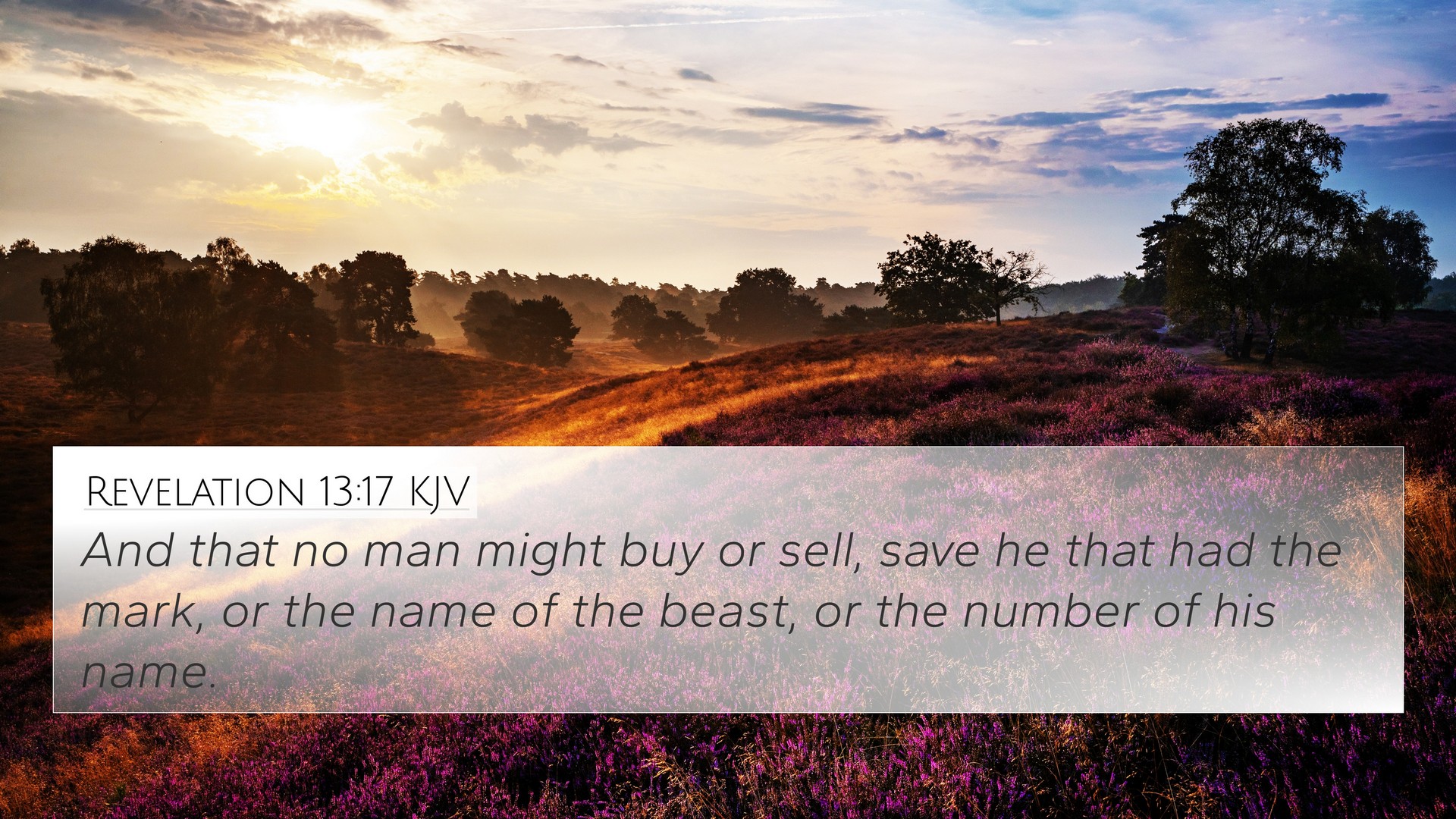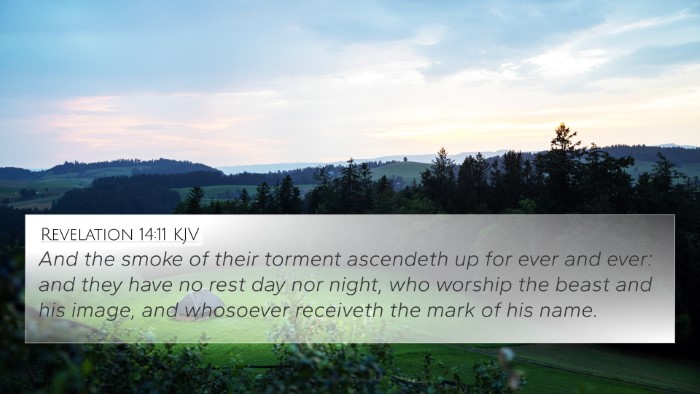Understanding Revelation 13:17
Revelation 13:17 states, "And that no man might buy or sell, save he that had the mark, or the name of the beast, or the number of his name." This verse is pivotal in the Book of Revelation and delivers profound implications regarding the end times, economic control, and the significance of allegiance to God versus allegiance to worldly systems.
Verse Explanation
The verse focuses on the seal of the beast—a mark indicating allegiance to the worldly system characterized by opposition to God. The mark is not only a symbol of ownership but also a practical requirement for commerce in a future society. This presents a stark choice for believers: to partake in worldly commerce and forego their faith, or to remain true to their convictions, potentially at the cost of their livelihood.
Commentary Insights
Matthew Henry's Commentary
Henry highlights that the mark signifies a clear and dreadful mark of apostasy, where individuals must choose between the mark of the beast, representing submission to an anti-Christ system, or resisting it, demonstrating their commitment to God. The absence of the mark results in dire consequences, underscoring the severity of loyalty in these last days.
Albert Barnes' Notes
Barnes elaborates on the economic implications of the mark. He suggests that accepting the mark correlates with embracing the principles of worldly governance and societal norms that stand against God’s commandments. The lack of ability to buy or sell creates an environment of pressure to conform for survival, reflecting the moral dilemma faced by believers.
Adam Clarke's Commentary
Clarke emphasizes the metaphorical nature of the mark and its connection to one’s character, suggesting that it represents a spiritual condition rather than merely a physical mark. He argues that true Christians will find ways to sustain their faith and reliance on God, even amidst economic restrictions.
Cross-Referencing Biblical Texts
Revelation 13:17 connects deeply with various other scriptures, providing a broader context for understanding its implications and themes. Here are some significant cross-references:
- Revelation 14:9-11: This passage elaborates on the fate of those who receive the mark of the beast, emphasizing the eternal consequences of this choice.
- Revelation 20:4: Discusses the martyrdom of those who refuse the mark and their eventual reward in the kingdom of God, highlighting the theme of faithfulness amidst trials.
- 1 John 2:15-17: Encourages believers to not love the world or the things in it, drawing a direct connection between worldly compliance and spiritual fidelity.
- Matthew 6:24: "No man can serve two masters" reinforces the necessity of choosing allegiance between God and worldly systems.
- Hebrews 11:24-26: Presents the example of Moses, who chose to suffer with God’s people rather than enjoy the fleeting pleasures of sin in Egypt.
- Philippians 3:18-19: Warns against those who are enemies of the cross of Christ, emphasizing that their end is destruction and contrasting them with the faithful.
- Daniel 3:16-18: The stand of Shadrach, Meshach, and Abednego against King Nebuchadnezzar illustrates the endurance of faith in the face of governmental pressure.
- 2 Timothy 3:12: Affirms that all who live godly in Christ Jesus will suffer persecution, linking back to the suffering that may accompany the refusal of the mark.
- James 4:4: Equates friendship with the world as enmity with God, reinforcing the choice believers must make between divine loyalty and worldly approval.
- Revelation 3:17-18: Encourages believers to recognize their true spiritual need and wealth found in Christ, as opposed to the materialism of the world.
Thematic Connections
When studying Revelation 13:17 through the lens of comparative analysis and thematic connections, several key themes emerge:
- The Costs of Discipleship: Following Christ often comes with sacrifices, and the refusal to conform to societal norms represents a significant expression of faith.
- Spiritual versus Material Sustenance: This verse illustrates the tension between physical needs and spiritual commitments, challenging believers to assess their priorities.
- Perseverance in Faith: The refusal to accept the mark symbolizes steadfastness and loyalty to God’s kingdom, even when faced with dire circumstances.
- Judgment and Justice: The narrative warns of future judgment for those who choose to align with the beast and suggests a divine reckoning for these choices.
Conclusion
In conclusion, Revelation 13:17 is a profound warning to believers about the spiritual consequences of allegiance to worldly systems and underscores the importance of faithfulness in the face of potential persecution. The aforementioned commentaries and cross-references serve as valuable tools for understanding the intricate dynamics of this scripture and its application to contemporary life.










